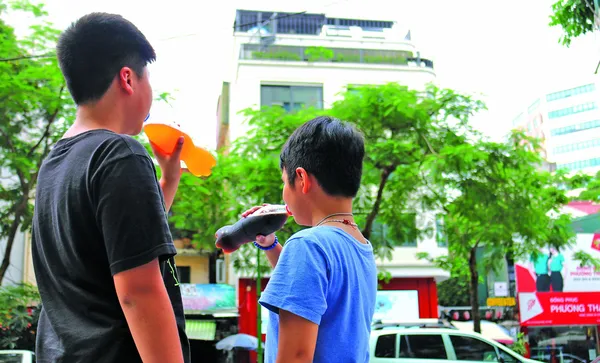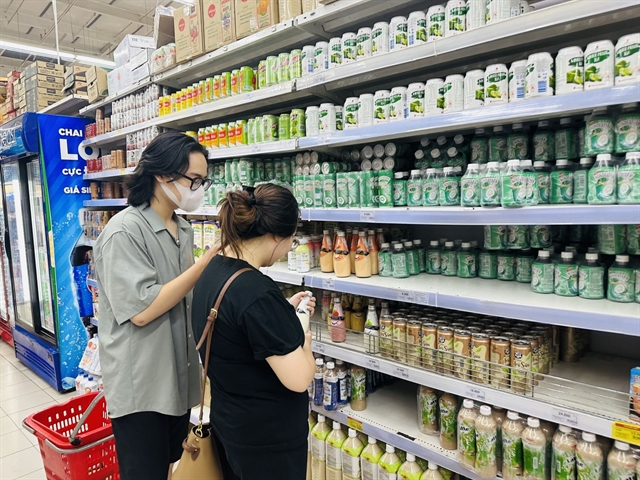 Economy
Economy

 |
| Health experts recommend introducing an excise tax on sugary beverages as a proven method, endorsed by the WHO, to cut consumption and curb associated health risks. — VNA/VNS Photo |
HÀ NỘI — Uncontrolled consumption of sugary drinks is a major contributing factor to the rising rates of obesity, type 2 diabetes, and metabolic disorders among adults and children nationwide.
These conditions also elevate risks for cardiovascular diseases, strokes and other severe complications.
According to Đinh Thị Thu Thủy, deputy director of the Department of Legal Affairs at the Ministry of Health, Việt Nam has experienced a sharp increase in sugar-sweetened beverage consumption in recent years.
Data from Euromonitor 2023 reveals that total sugary drink consumption rose dramatically from 1.59 billion litres in 2009 to 6.67 billion litres in 2023, an increase of 420 per cent.
Per capita consumption also grew from 18 litres annually in 2009 to 66 litres in 2023, a staggering 350 per cent rise.
The Preventive Medicine Department reports that Vietnamese citizens consume an average of 46.5 grams of sugar daily, nearing the World Health Organization’s (WHO) recommended limit of 50 grams per person per day.
This figure is nearly twice the ideal intake of less than 25 grams daily for optimal health, based on a 2,000-calorie diet.
A UNICEF study on adolescents' consumption habits found that 43 per cent of teenagers in Việt Nam drink sugary beverages more than twice a week, 13.5 per cent consume them almost daily, and over 20 per cent drink two or more cans or bottles in one sitting.
A UNICEF representative said reducing sugary drink consumption has enormous potential to safeguard the health of Vietnamese children and teenagers.
Health experts recommend introducing an excise tax on these kind of beverages as a proven method, endorsed by the WHO, to cut consumption and curb associated health risks.
By increasing the price, taxation could encourage consumers to opt for healthier alternatives, lowering the prevalence of obesity and diet-related non-communicable diseases, particularly diabetes.
Thuỷ highlighted that the Ministry of Health has worked closely with the Ministry of Finance to provide data on sugary drink consumption and its harmful effects.
In response, the Ministry of Finance has included beverages containing sugar in the draft amendment to the Special Consumption Tax Law.
This marks the first time sugary drinks are being considered for taxation in Việt Nam.
The draft law, currently under review by the National Assembly, proposes a 10 per cent tax on beverages containing more than five grams of sugar per 100 millilitres. This aims to incentivise manufacturers to produce low-sugar options and encourage healthier consumer choices.
Nguyễn Tuấn Lâm, a WHO representative in Việt Nam, emphasised the link between regular sugary drink consumption and health conditions such as tooth decay, obesity, type 2 diabetes, cardiovascular diseases, kidney disease, non-alcoholic fatty liver disease, and gout.
Excise taxes are a highly effective way to reduce sugary drink consumption. Now it is the right time to implement such a tax in Việt Nam, according to Dr Lâm.
He proposed a gradual tax increase to 40 per cent of the manufacturer’s price by 2030, aligning with WHO recommendations for a 20 per cent impact on retail prices.
Lâm also supported additional measures, including front-of-package labelling and advertising restrictions, to further limit consumption.
The WHO advises that free sugar intake should not exceed 10 per cent of daily energy consumption, equivalent to 12 teaspoons. Ideally, this should be reduced to 5 per cent, six teaspoons, to yield greater health benefits.
UNICEF and WHO both report that many nations have implemented excise taxes to combat excessive sugary drink consumption.
The World Bank reported that by July 2023, 108 countries and territories had adopted nationwide excise tax policies on sugary beverages, with an additional three applying them regionally.
In ASEAN, six nations including Thailand, the Philippines, Cambodia, Malaysia, Brunei and Indonesia have already introduced such taxes. These policies have proven effective in reducing consumption and fostering healthier habits. — VNS




